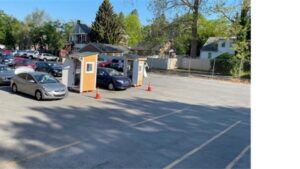Food insecurity is an umbrella term, defined as the inability to access nutritious food for an active, healthy life. Despite the many grocery stores near Carlisle, including major chains like Walmart and Weis, there is still a staggering amount of food insecurity within the town. Although there is a certain amount of variety available in Carlisle, accessibility to food varieties is not necessarily available to all. Much of Carlisle’s food insecurity stems from the inability to readily access nutritious and sustaining foods. The effort to obtain food is also daunting without a vehicle; walking from the northern point of town to Weis is around 28 minutes, or 1.8 miles. Similarly, it would take around five minutes to drive to the store, not including the time necessary to actually shop for the items needed. Beyond the city itself, it takes a significantly longer amount of time to travel to major grocery hubs. While there are potentially other options to receive fresh produce, such as grocery delivery through Instacart, they are significantly more costly than making the trek to the store in person. Even the many fast-food restaurants in town, which can be considered as a cheaper, yet less nutritional, option for food, can pose an issue of inaccessibility, as many of them require a car to safely arrive and receive the order.
Food security and lack of access to nutritious and affordable food exists beyond the small town of Carlisle. There are national programs that aim to lessen the effects of food insecurity in the country, but they are not without limitations. This is partially due to the national stigma about receiving aid in order to feed a family; cultural norms often perceive food assistance as taking from others and the recipients perceive themselves as not worthy of receiving aid. There is also the issue of lack of awareness of availability of food support. In Carlisle, particularly among newer immigrant populations, there is a lack of understanding of availability through these federal programs.

Cars lines up at the Project SHARE Farmstand in Carlisle, PA (Project SHARE)
There are some efforts to relieve the strain of families dealing with food insecurity, specifically since there is a concern about being able to affordably feed a family food with adequate nutritional value. Some may choose to skip meals in order to feed the rest of their family, an example of “low food security (at least some household members were uncertain of having enough food because they had insufficient money and other resources for food),” (Gundersen, 2014, p. 375). A local way to combat this food insecurity has been made by Project SHARE Farmstand, which allows anyone to receive food regardless of the ability to pay. Although this is great in practice, it still remains inaccessible to those without cars, as it functions as a drive through. There is also a physical food pantry in town, which is also a great alternative for families and individuals to receive nutritious food. However, this has limitations as it requires a family to have “an income falling below 185% of the federal poverty level,” (Project SHARE). Food insecurity is real and persistent, not only in Carlisle, but throughout the country,
Sources:
- Gundersen, C., et al. (2014).“‘Map the Meal Gap’: Exploring Food Insecurity at the Local Level.” Applied Economic Perspectives and Policy, 36(3), 2014, 373–386.
- History. (n.d.). Project SHARE, Retrieved September 19, 2024, from projectsharepa.org/history-info/.